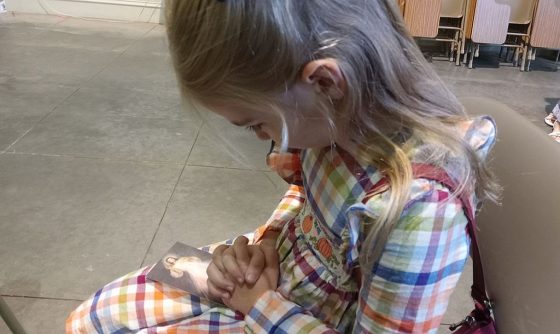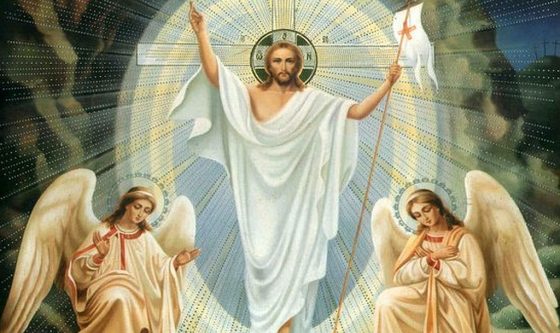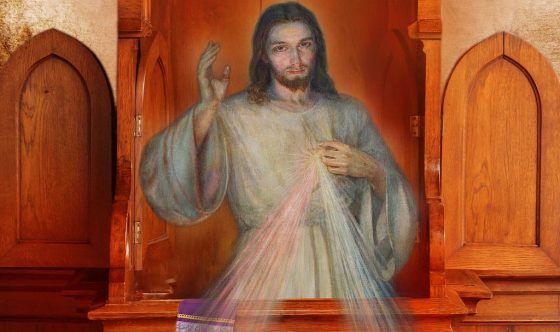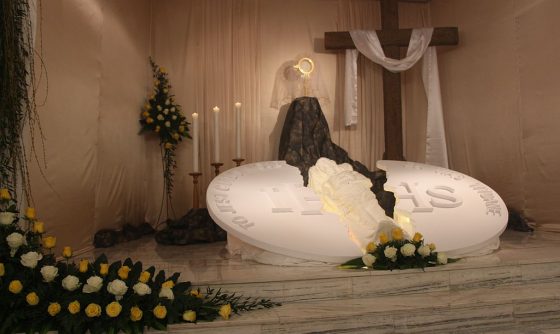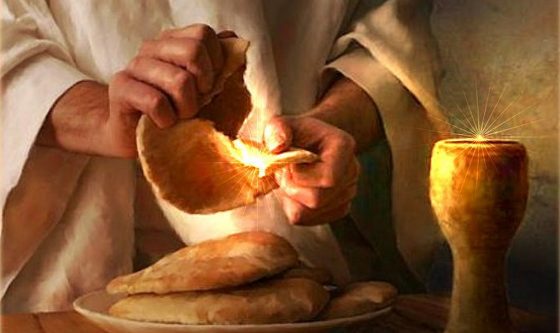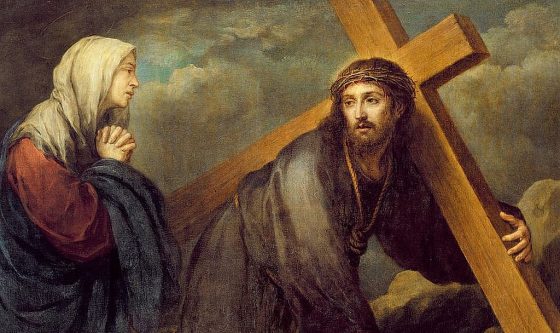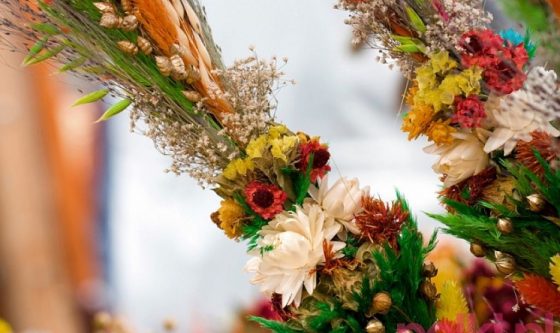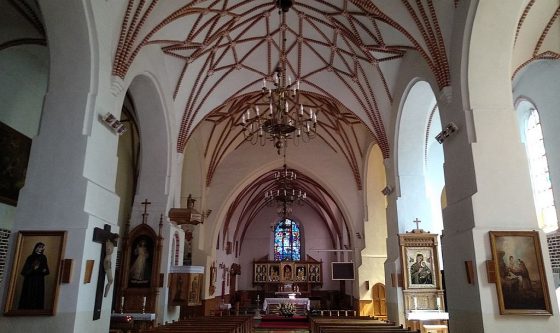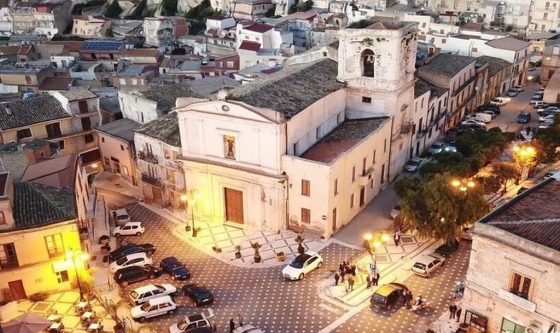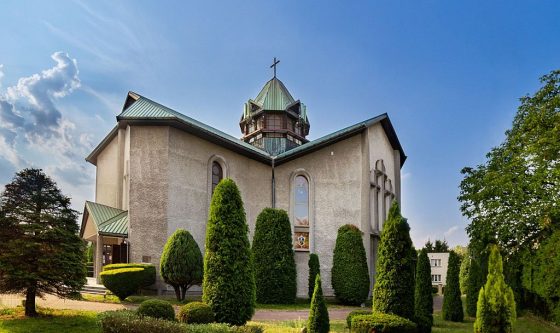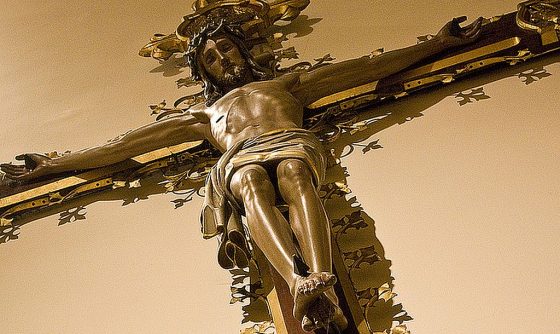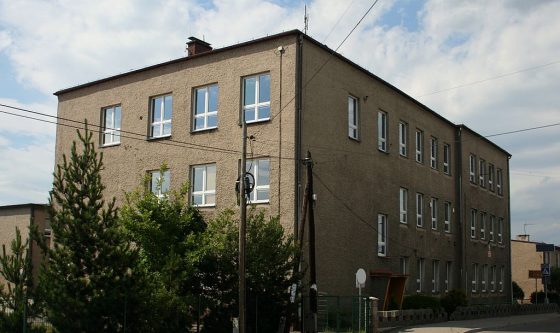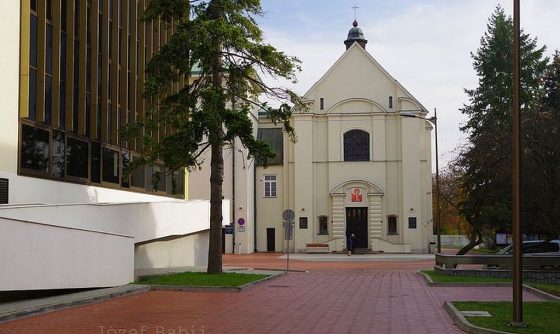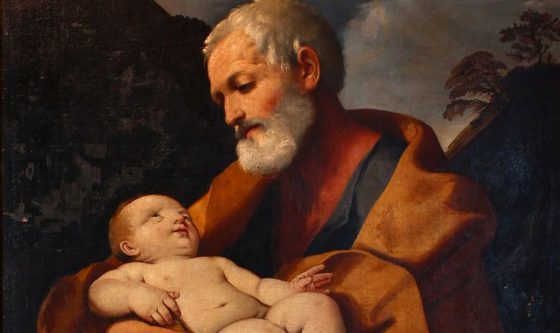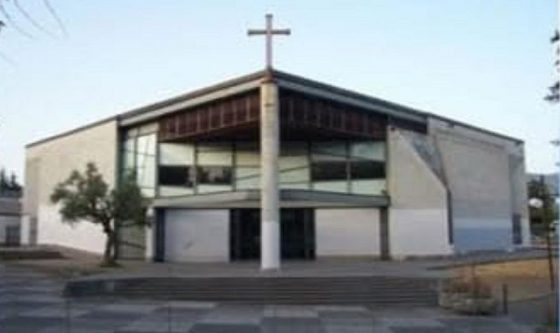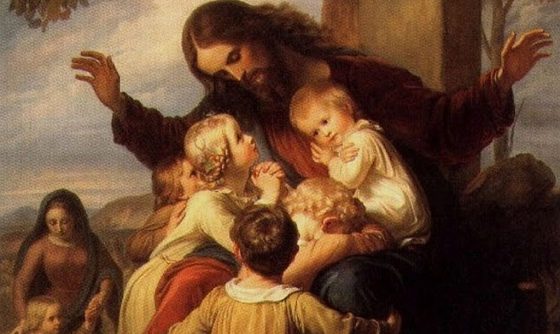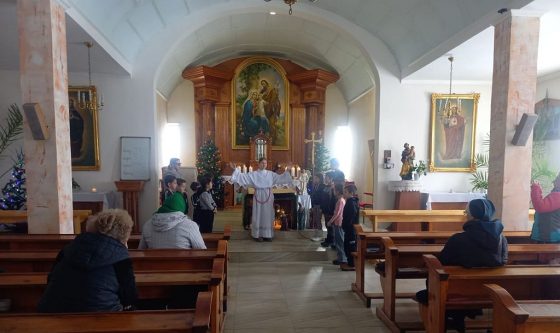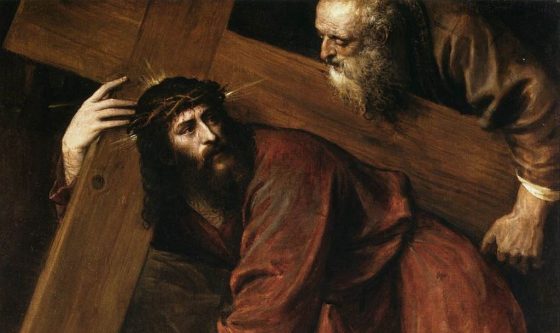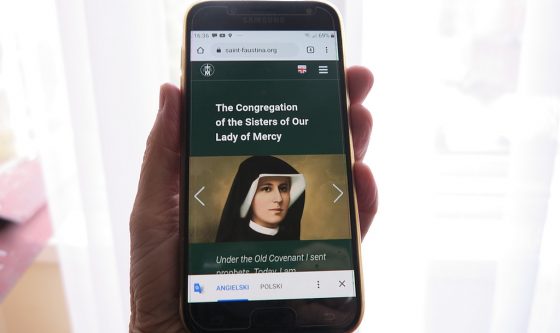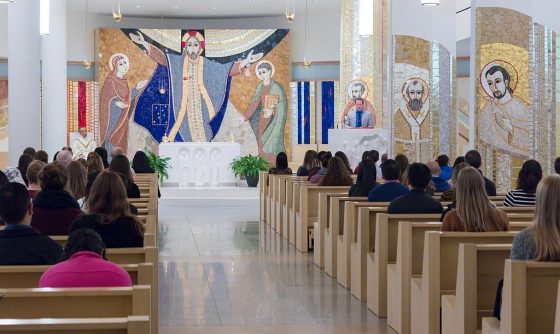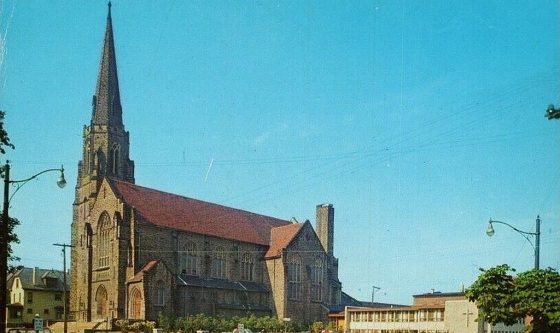Good Friday is the first day of the novena before the feast of Divine Mercy. Jesus asked St. Faustina to use it in order to prepare for the celebration, in which we worship God in the mystery of His unfathomable Mercy. The novena consists of nine days of recitation of the Chaplet of Divine Mercy. Jesus said about the power of this novena that it entreat just about everything which is in accordance with God’s will, which means that is good for us on earth and in eternity. Out of devotion, you can also recite a novena which Jesus dictated to Sister Faustina. The ceremonial start of this novena will take place at the Shrine of Divine Mercy after the prayer at the Hour of Mercy (3:00 pm), which is celebrated and experienced in a special way on Good Friday. Live broadcast on-line and TVP 3.
Allelujah!!! Jesus lives!!! He lives among us and in us, when we are in a state of grace. Love wins over sin and life over death. Jesus overcame all evil and Satan, the enemy of man. Since then we can also can gain the victory over sin and human weakness through Jesus, and thus live more fully in communion with God. Let God’s mercy be praised in us and through us! We wish you all joyous celebration of this greatest mystery of our faith!
On the occasion of Easter and the Feast of Divine Mercy, the Sisters of the Congregation of Our Lady of Mercy would like to wish all our Benefactors, Associates supporting our apostolic works, as well as Visitors to the Congregation’s website and Members of the Facebook group of the Shrine of Divine Mercy. May you all experience a joyful encounter with the risen, merciful Lord. He is the One who brings peace which the world cannot give, fills our hearts with love and always bestows blessings, as we see Him in the Image which He instructed St. Faustina to paint. We also wish you all graces, and on the Feast of Mercy, may you be granted the greatest promise of Jesus, which is complete absolution from sins and punishment. Blessed Easter to you all!!!
The greatest miracles of Divine Mercy take place in the confessional, as they turn the death of sin to life. Jesus said to St. Sister Faustina: Tell souls where they are to look for solace; that is, in the Tribunal of Mercy [the Sacrament of Reconciliation] There the greatest miracles take place [and] are incessantly repeated. To avail oneself of this miracle, it is not necessary to go on a great pilgrimage or to carry out some external ceremony; it suffices to come with faith to the feet of My representative and to reveal to him one’s misery, and the miracle of Divine Mercy will be fully demonstrated. Were a soul like a decaying corpse so that from a human standpoint, there would be no [hope of] restoration and everything would already be lost, it is not so with God. The miracle of Divine Mercy restores that soul in full. Oh, how miserable are those who do not take advantage of the miracle of God‟s mercy! You will call out in vain, but it will be too late (Diary, 1448). At the Shrine of Divine Mercy in Krakow-Łagiewniki, priests stay in confessionals every day – from 8:00 am to 7:00 pm in the basilica (from Maundy Thursday until 5:45 pm), and 6:00 am-6:30 am and 4:30 pm-6:00 pm. Since in the Holy Week there are long queues to the confessionals, we recommend coming earlier to confess rather than wait the last days before Easter.
In the Catholic Church, Holy Saturday is a day of mourning after the crucifixion of Jesus Christ. In churches and chapels, the “Tomb of the Lord” is arranged, we adore Jesus in the Blessed Sacrament, thanking Him for the work of Redemption and graces brought by the Cross for our salvation, and we beg for mercy for us and the whole world. At the Shrine of Divine Mercy in the morning, foods are blessed on the Christmas table. About 3:00 pm, prayer at the Hour of Mercy is observed, combined with the novena before the Feast of Divine Mercy, followed by memoration of the descent of Jesus into the abyss. After nightfall, at 8:00 pm in front of the basilica, the rites of the Easter Vigil will begin with the Eucharist, where candles should be brought, because this liturgy renews our vows of baptism.
Good Friday is the only day in the year when there is no Holy Mass, as the most perfect sacrifice was made by Jesus Himself at the Cross. Jesus told St. Faustina in one of the many revelations associated with His Passion: On the cross, the fountain of My mercy was opened wide by the lance for all souls – no one have I excluded! (Diary, 1182). On Good Friday, the 3:00 pm prayer, recited at the moment of the agony of Jesus on the Cross (Hour of Mercy) the is celebrated in a particularly solemn manner at the Shrine of Divine Mercy and followed by the start of the novena before the Feast of Mercy (transmission available at: www.saint-faustina.org). After the novena, at approx. 3:30 pm, the Way of the Cross will be celebrated. The Good Friday Liturgy of the Passion will begin in the Basilica at 6:00 pm. After Adoration of the Cross and Holy Communion, an Eucharistic procession will set off to the Holy Sepulcher, which is traditionally arranged in the convents’ Chapel of the Passion. There will be a continual adoration of Jesus in the Blessed Sacrament, which begins the Lenten Lamentations. On Good Friday, strict fasting and abstinence from all meat is required.
Trust. This distrust of My goodness hurts Me very much. If My death has not convinced you of My love, what will? (Diary, 580), Jesus complained to St. Faustina. His life, teachings, and miracles most fully revealed the goodness of God and his merciful love to the world. And yet, it so difficult for us to trust in God, so deep is our wound of distrust left by the original sin and our personal sins. Sister Faustina lifts the veil of heaven so we can deepen our knowledge of God’s merciful love, most fully revealed by Jesus’ passion and death on the Cross. This knowledge awakens and grows an attitude of trust in us, which expresses itself in fulfilling God’s will contained in the Commandments, the word of God, duties of the state or inspiration of the Holy Spirit. The will of God, as St. Faustina used to say, is mercy itself, which is why she served it faithfully and prayed with the words: Should You take me in my youth, be blessed; should You let me live to a ripe old age, be blessed. Should You give me health and strength, be blessed; should You confine me to a bed of pain for my whole life, be blessed. Should you give only failures and disappointments in life, be blessed. Should You allow my purest intentions to be condemned, be blessed. Should You enlighten my mind, be blessed. Should You leave me in darkness and all kinds of torments, be blessed. From this moment on, I live in the deepest peace, because the Lord himself is carrying me in the hollow of His hand. He, Lord of unfathomable mercy, knows that I desire Him alone in all things, always and everywhere (Diary, 1264). Doing the will of God is not only an expression of trust in Him, but also a release from fear, pride and selfishness, that brings peace and joy to the heart, so that we can more fully live in the freedom as God’s children and to participate in the life and mission of Jesus. It is the shortest way to union with God in love.
Holy Thursday is the day when we give thanks to merciful God for the gift of priesthood and the Eucharist. Jesus allowed me to enter the Cenacle, wrote St. Faustina about her mystical experience, and I was a witness to what happened there. However, I was most deeply moved when, before the Consecration, Jesus raised His eyes to heaven and entered into a mysterious conversation with His Father. It is only in eternity that we shall really understand that moment. His eyes were like two flames; His face was radiant, white as snow; His whole personage full of majesty, His soul full of longing. At the moment of Consecration, love rested satiated – the sacrifice fully consummated. Now only the external ceremony of death will be carried out – external destruction; the essence [of it] is in the Cenacle (Diary, 684).
At the Shrine of Divine Mercy in Krakow-Łagiewniki, on Holy Thursday (April 17) at 6:00 pm, Mass of the Lord’s Supper will be presided by Bishop Jan Zając, the honorary curator of the Shrine. The Holy Thursday liturgy will be completed by the procession of the Blessed Sacrament to the Altar of Repose, which traditionally arranged in the convent chapel of the miracle-famous image of Merciful Jesus and the tomb of St. Faustina. Adoration of Jesus in Repose will last all night.
The devotion, in which we contemplate the Passion of our Lord Jesus Christ, allows us to discover and explore the merciful love of God to man, to develop the attitude of trusting God in every situation, even the difficult and painful ones and the attitude of mercy toward our neighbors. Jesus took our sins upon Himself and suffered ignominious death for every one of us, to rise again so that we may have life and enjoy it now and forever.
On every Friday at Shrine of Divine Mercy, a communal devotion of the Stations of the Cross, or Way of Sorrows, will be celebrated at the Basilica at 4:00 pm and in the chapel of the Divine Mercy Image and the tomb of St. Faustina at 7:00 pm, with the exception of the first Friday, when the Way will be celebrated at 6:15 pm (online broadcast available at www.saint-faustina.org).
April 13 is Passion Sunday, also celebrated as Palm Sunday, which starts the Holy Week. On this day, the account of Jesus Christ’s Passion is read from the Gospel during the Holy Mass. The Eucharist is preceded by a procession with colorful Polish palms as a celebration of the memory of Jesus’ triumphal entry into Jerusalem. The palms symbolize the Divine life being reborn in the souls of the faithful. At the Shrine in Krakow-Łagiewniki, Bp. Jan Zając, priests, religious sisters and the faithful will leave the chapel of the miracle-famous Divine Mercy Image and the tomb of St. Faustina in a solemn procession with palms at 10:15 am and will proceed to the basilica, where Holy Mass will be celebrated. The evangelic description of Jesus’ entry to Jerusalem is supplemented by the account of St. Faustina’s visions from her Diary: I saw Jesus riding on a donkey’s foal, and the disciples and a great multitude with branches in their hands joyfully accompanying the Lord Jesus. Some strewed them before His feet where He was riding, while others raised their branches in the air, leaping and jumping before the Lord and not knowing what to do for joy. And I saw another crowd which came out to meet Jesus, likewise with joyful faces and with branches in their hands, and they were crying out unceasingly with joy. There were little children there also. But Jesus was very grave, and the Lord gave me to know how much He was suffering at the time. And at that moment, I saw nothing but only Jesus, whose Heart was saturated with ingratitude (Diary, 642). Jesus gave me to understand how much He had suffered in that triumphal procession. “Hosanna” was reverberating in Jesus’ heart as an echo of ‘Crucify’. Jesus allowed me to feel this in a special way (Diary, 1028).
From April 6 to 8 this year, Sr. Anna Maria Trzcińska from the Kraków community of the Congregation of the Mother of Divine Mercy, in cooperation with the sisters from the Ełk community, will lead a Lenten retreat at the parish of St. John the Baptist in the town of Wizna, Diocese of Łomża. The theme of the retreat will be the mystery of God’s mercy and trust, which is the first human response to God’s preceding merciful love.
On April 5 and 6, Sr. Tymoteusza Kmiotek and Sr. Wincenta Mąka from the Roman community of the Congregation of the Sisters of Our Lady of Mercy will share the message of Mercy recorded in the Diary of St. Faustina with the faithful in St. Venera Parish in Grotte, in the Diocese of Agrigento. The program includes conferences, communal prayer at the Hour of Mercy and the Chaplet of Divine Mercy, veneration of the relics of St. Faustina, and a fraternal gathering.
On April 5–6 this year, Sr. Emanuela, Sr. Maria Faustyna, Sr. Eliana, and Sr. Jaśmina will share the message of Mercy and the spiritual legacy of St. Faustina with the faithful at St. Luke’s Parish in Sosnowiec. The program also includes liturgical service.
Concern for the conversion of sinners. This is the greatest act of mercy, which has us keep in mind the eternal wellbeing of another human being. Sister Faustina, following Jesus’ example, even made the sacrifice of her life with this intention. The mystical experiences she met heaven, purgatory and hell, because she said that no sacrifice is too great to save a man for eternity. Jesus invited her – and through it well and us – to cooperate in the work of saving sinners, even those for which humanly speaking, there is no hope. Many times He asked: I thirst. I thirst for the salvation of souls. Help Me, My daughter, to save souls. Join your sufferings to My Passion; and offer them to the heavenly Father for sinners (Diary, 1032). The loss of each soul plunges Me into mortal sadness. You always console Me when you pray for sinners. The prayer most pleasing to Me; is prayer for the conversion of sinners. Know, My daughter, that this prayer is always heard and answered (Diary, 1397).
At the invitation of Jesus, Sister Faustina responded generously: O Jesus, I want to bring souls to the fount of Your mercy to draw the reviving water of life with the vessel of trust. The soul desirous of more of God’s mercy should approach God with greater trust; and if her trust in God is unlimited, then the mercy of God toward it will be likewise limitless. O my God, Who know every beat of my heart, You know how eagerly I desire that all hearts would beat for You alone, that every soul glorify the greatness of Your mercy (Diary, 1489).
On April 4th, at the Shrine of Divine Mercy in Kraków-Łagiewniki, in the chapel with the famous image of the Merciful Jesus and the tomb of St. Faustina, a Way of the Cross service for foreigners will begin at 7:45 PM. The devotion will be conducted in English, with reflections also in other languages, including French, Spanish, Italian, Slovak, Russian, Swahili, and Hindi (India). The event is organized by the Sisters of the Congregation of Our Lady of Mercy and participants of the Sunday English-language Eucharist at the Łagiewniki Shrine.
Under this motto, from March 31 to April 2 this year, a retreat will be held for children from the Primary School of the Silesian Land in Piece and the Tadeusz Kościuszko Primary School in Gaszowice. It will be led by Sr. Tobiana and Sr. Agnes from the Krakow community of the Congregation of the Mother of God of Mercy, using methods that actively engage participants in this encounter with Merciful Jesus.
Under this motto, from March 30 to April 2 of this year, Sr. Gaudia Skass from the Krakow community of the Congregation of the Sisters of Our Lady of Mercy will lead Lenten retreats for the Catholic University of Lublin’s Academic Ministry. The retreats, based on the Gospel and the symbolism of the image of the Merciful Jesus, will focus on the need for closeness and building a relationship with God.
In March in all chapels of the Congregation of the Sisters of Our Lady of Mercy, including the one with the miracle-famous Divine Mercy image and the tomb of St. Faustina at the Shrine in Krakow-Łagiewniki, evening devotions will be held to memorate St. Joseph. The sisters, since the early history of the Congregation, have had special veneration for St. Joseph, Spouse of the Mother of God and diligent protector of Christ, whose care they entrust themselves to. The Saint provides aid not only in respect to material things, but also spiritual ones. He gave St. Faustina “to know how much he is supporting this work of mercy” which the Lord commanded – one of proclaiming the message of mercy to the world, and promised his protection. However, he also demanded her continuing devotion and asked that she recite three daily prayers and one Memorate to St. Joseph (Diary, 1203). Our daily on-line broadcasts (except Thursdays and Sundays) at 7:00 pm will allow you to join in the singing of the Litany of St. Joseph with the sisters to thank for his fatherly care and to ask for his powerful intercession in our intentions before God.
As part of this series, a retreat will take place from March 28-30 at the Shrine of Divine Mercy in Kraków-Łagiewniki, dedicated to the figure of St. Paul the Apostle. By learning about his life and delving into his letters to the Church communities, one can see how great God’s mercy is, which brought about the complete transformation of his life. Captured by Mercy, he undertook the mission of evangelizing the Gentiles, assigned to him by the Lord. The retreat will be led by Dr. Danuta Piekarz, a biblical scholar and Italianist, lecturer at the Jagiellonian University, the Higher Seminary of the Pauline Fathers, and the Dominican Philosophical-Theological College in Kraków. She is an author of books and collaborates with the Salvatorian Center for Spiritual Formation.
On March 29 and 30, Sr. Wincenta Mąka and Sr. Amata Strzępek from the Roman community of the Congregation of the Sisters of Our Lady of Mercy will share the spiritual heritage of St. Faustina with the faithful at the Parish of Our Lady of Lourdes in Rende-Cosenza, Calabria. The sisters will proclaim the message of Mercy in this town during the so-called “Days of Divine Mercy.” The program includes: Holy Masses, veneration of St. Faustina’s relics, lectures, testimonies, prayer at the Hour of Mercy, the Chaplet of Divine Mercy, and meetings with the “Faustinum” community and other groups devoted to Divine Mercy.
For the period of Lent, we usually make resolutions, which usually involves doing the deeds that Jesus asked us to do: almsgiving, prayer and fasting, performed secretly with the pure intention of love for God and for people, not for applause or recognition. Saint Faustina also practiced them. In her religious life, however, she made one specific resolution, which she realized not only during Lent, but always, namely, she joined Merciful Jesus living in her soul, through an aspiration. When she wanted to change this decision, Jesus would not let her, because this daily practice leads to the development of a deep relationship with Him, to living our daily lives with Him.
People from many countries of the world participating in the work of the Perpetual Chaplet of Divine Mercy are praying not only in their own intentions, but also asking for “mercy on us and the whole world”. A detailed intention for March is prayer for a fruitful experience of Lent, and the grace of conversion for all sinners, especially those in danger of losing their salvation.
The work of Perpetual Chaplet is a response to the request of Jesus to constantly implore for mercy “for us and the whole world”. The work has been operated by the Congregation of the Sisters of Our Lady of Mercy at: www.faustyna.pl since 2011. Anyone can participate in it by filling out a short form and declare to say the Chaplet of Divine Mercy, which Jesus dictated to St. Faustina at least once.
Works of mercy. This fast is what God desires. The following event in the life of St. Faustina is among the things which can convince us of it: The doctor did not allow me to go to the chapel to attend the Passion Service, although I had a great desire for it; however, I prayed in my own room. Suddenly I heard the bell in the next room, and I went in and rendered a service to a seriously sick person. When I returned to my room, I suddenly saw the Lord Jesus, who said, My daughter, you gave Me greater pleasure by rendering Me that service than if you had prayed for a long time. I answered, But it was not to You, Jesus, but to that patient that I rendered this service. And the Lord answered me, Yes, My daughter, but whatever you do for your neighbor, you do for Me (Diary, 1029).
Jesus instructed St. Faustina, and through her, all of us, that there are three ways to provide good to our neighbors: by deed, word, and prayer. He said: In these three degrees is contained the fullness of mercy, and it is an unquestionable proof of love for Me. By this means a soul glorifies and pays reverence to My mercy. (Diary, 742). Jesus asked Sister Faustina to do at least one act of mercy towards her neighbors during a day, and do it out of love for Him. This is the only wealth on earth that has eternal value. It makes us beautiful in our humanity and our Christian vocation, but also rich before God.
Under this motto, from March 24 to 28 of this year, a retreat will be held in Rybnik for children from Primary School No. 5 named after Nicolaus Copernicus and Primary School No. 4 named after John Paul II. It will be led by Sr. Tobiana and Sr. Agnes from the Kraków community of the Congregation of the Sisters of Our Lady of Mercy, using methods that actively engage participants in this encounter with the Merciful Jesus.
As part of the Samaritan Woman project, a women’s retreat will take place from March 21-23, 2025, at St. Joseph’s Parish in Makinsk under the theme: “Little girl, I say to you, arise.” The program includes meditations on Gospel events: the healing of the woman suffering from hemorrhage and the raising of Jairus’ daughter, conferences, and workshops. The retreat, led by Sr. Anastasis Omelchenko from the Petropavlovsk community of the Congregation of the Sisters of Our Lady of Mercy, Sr. Kazimiera Wanat, Sr. Madlen Hofmann, and Fr. Hans Reiner, conveys the message that “you are a daughter of God. Beloved. Until you discover this within yourself, everything may have power over you. You can give everything away and still bleed, trapped in self-rejection. But one touch of Jesus – with faith – can change everything, lift you up, and give you strength to live.”
This is the theme of a new retreat cycle organized by the “Faustinum” association at the Sanctuary of Divine Mercy in Kraków-Łagiewniki. The first retreat in this cycle will take place from March 21st to 23rd and will focus on the Samaritan woman, who, after her encounter with Jesus at the well, left as a transformed woman, changed by mercy. The key to this transformation was her honesty. “Tell Me everything,” Jesus says in His dialogue with a suffering soul, “be honest with Me, reveal all the wounds of your heart, and I will heal them” (Diary 1487). The retreat will be led by Fr. Marcin Ciunel MS, a biblical scholar, spiritual director at the Higher Seminary of the Missionaries of La Salette in Kraków, and Sr. M. Eliana Chmielewska ISMM from the “Faustinum” community in Kraków.
More information at: www.faustinum.pl
Meditating on the Passion of Jesus. During Lent, we consider the suffering of Jesus, which He took upon Himself out of love for us and for our salvation, more often than in other times of the year. We participate in the devotion of the cross and Bitter Lamentations, and we read the Scriptures that announce and describe the paschal events. Jesus instructed Faustina, and through her all of us, to consider His Passion in such a way as if it took place only for her sake (cf. (Diary, 1761). He explained: There is more merit to one hour of meditation on My sorrowful Passion than there is to a whole year of flagellation that draws blood; the contemplation of My painful wounds is of great profit to you, and it brings Me great joy 369). My daughter, meditate frequently on the sufferings which I have undergone for your sake, and then nothing of what you suffer for Me will seem great to you. You please Me most when you meditate on My Sorrowful Passion. Join your little sufferings to My Sorrowful Passion, so that they may have infinite value before My Majesty (Diary, 1512). Following these indications of Jesus, Sister Faustina penetrated deeply into the mystery of the merciful love of God for every man and thanked Jesus for the Book from which she learned to love God and people. That book is Your Passion which You underwent for love of me. It is from this book that I have learned how to love God and souls. In this book there are found for us inexhaustible treasures. O Jesus, how few souls understand You in Your martyrdom of love! Oh, how great is the fire of purest love which burns in Your Most Sacred Heart! Happy the soul that has come to understand the love of the Heart of Jesus! (Diary, 304).
On March 22, at 5 p.m. at the Shrine of Divine Mercy in Krakow-Łagiewniki, Holy Mass will be celebrated at the grace-famous image of Merciful Jesus and the tomb of St. Faustina for all the donors and contributors supporting the www.faustyna.pl website, including its 8 language versions, on top of all the apostolic works the website manages, particularly the Chaplet for the Dying and the online video streaming from the Krakow-Łagiewniki Shrine. Thanks to the apostolic work, commitment, and financial support of many people, through these efforts we bring the gift of the message of Mercy to the world and provide concrete help to those in greatest need. We repay this support with prayer, which we offer daily to Divine Mercy through the intercession of St. Faustina, for the intentions of all Benefactors and Donors.
On March 22, 2025, the traditional “Evening with Merciful Jesus” will take place at the National Shrine of St. John Paul II in Washington, USA. It will be led by the sisters from the Washington community of the Congregation of the Sisters of Our Lady of Mercy. The program includes the Hour of Mercy and the Chaplet, adoration with the worship of Jesus in the Blessed Sacrament and intercessory prayer, the Sacrament of Confession, and a conference. Sister Caterina Esselen will speak about Jesus’ words: “Believe in My wounds,” recorded in St. Faustina’s “Diary,” no. 379. “Evenings with Merciful Jesus” are organized for young people who want to follow in the footsteps of St. Faustina and St. John Paul II and discover a new quality of life in friendship with Merciful Jesus.
The conference by Sister Faustyna Szaboová ISMM from the previous meeting: “The Struggles of St. Faustina on the Path to Holiness.”
From March 19 to 21 of this year, Sr. Donata Farbaniec and Sr. Faustia Szaboóva from the Washington community of the Congregation of the Sisters of Our Lady of Mercy will lead a retreat at All Saints Parish in the city of Butler, Pennsylvania. The theme of the retreat will be the unfathomable mercy of God, most fully revealed through Jesus Christ and recorded in the Holy Scriptures, and recalled in the message given to St. Faustina and written in her “Diary.”











